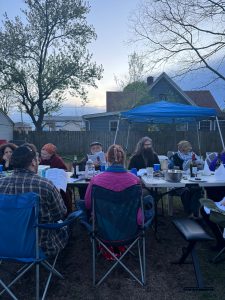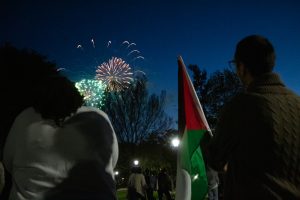On October 12th, the Michiana Friends of Palestine and other local allies of the Palestinian people held a rally to raise awareness and demonstrate support for the millions of Palestinians currently under the shadow of an impending genocide in Gaza.
A coalition of groups in solidarity with the Palestinian cause including Student Voices for Palestine, SolidarityND, and members of the local Palestinian community both at Notre Dame and South Bend gathered at Hunt Plaza, a place in South Bend historically known for hosting political demonstrations. Flags of green, white, black, and red along with banners demanding peace and freedom in the region were flown to traditional Palestinian folk songs as well as chants like “From the River to the Sea, Palestine Will Be Free” and “Not Another Nickel, Not Another Dime for Israel’s Crimes”.
It was, all in all, a peaceful protest save for a strange counter-protestor, who was your normal right-wing provocateur. The local news covered the event with the reporters at the scene being genuinely interested in what the protestors had to say; a noteworthy example of local media’s vital function in a community and its ability to pierce through the narratives pushed by the mainstream media.
At a time when Israel is preparing for a full-on genocide, we must stand with the Palestinians. The Israeli Defence Minister Yoav Gallant has made no attempt at hiding his contempt for the Palestinians, calling them ‘human animals’, cutting off access to water, fuel, electricity, and food to the already blockaded area, and ordering civilians to leave their homes. To cap it off, Israeli officials are currently preparing for a ground invasion of Gaza and even nuclear attacks, while bombarding the region and killing countless civilians. The US has repeatedly defended this as Israel’s right to defend itself. But apparently, implicit in this right is Israel’s right to bomb hospitals and buildings, to displace millions from their homes again and again.
Because the US is planning to rush military aid and diplomatic backing to Israel, even when it is planning a genocide, it is critical that we continue to denounce Israeli war crimes and American backing of them while supporting the Palestinians in their fight for independence and liberation. Yes, what happened to the Israeli civilians is a tragedy. Still, one must be either incredibly naive or blinded by ideology to refuse to recognize that, as the Kroc Institute put it, this violence did not occur “in a vacuum but arises in the context of ongoing Israeli occupation and dispossession of Palestinians in East Jerusalem and elsewhere”. Unfortunately, most in the West are both the former and the latter. One must examine Hamas’ recent attack in the context of decades of forced displacement, discrimination, humiliation, and failed attempts at peace talks derailed by Zionist aggression. Attacks by Israeli settlers and soldiers had been escalating with almost one Palestinian dying every single day in 2023 prior to the attack. The Student Voices for Palestine best framed what is at stake in their statement for the rally:
“As this war continues to claim the lives of thousands of Palestinians and Israelis, the media holds a clear bias in reporting what is happening to Palestinians in the Gaza Strip and the West Bank. In several news reports and interviews, the casualties among Palestinian civilians including women and children were described as a necessary evil to end terrorism. We rallied in the name of Palestine to remind people that the Palestinians are human too, especially as Western media continues dehumanizing Palestinians. With that said, we rallied to remind people that Palestinian lives hold the same value as any other human life and that Israel’s practices of genocide and collective punishment, including the cutting of the water supplies, electricity, fuel, and medical supplies for hospitals, and the targeting of UN schools and shelters should not go unnoticed by the international community. Finally, we rallied to remind Palestinians that they are not alone in this situation even as it seems like it is the case with few reporting and condemning the atrocities and war crimes Israel is doing against Palestinian civilians.”
Perhaps, the largest significance of the protest was that it served as one of the few available forms of expression counter to the pro-Israeli or supposedly ‘neutral’ views dominant at Notre Dame. We are witnessing an almost unprecedented wave of activism in support of Palestine, mostly driven by students at college campuses all across the US. The rally on October 12th was one of many displays of this outrage over what is happening in Gaza. Yet, our university does not seem interested in the Palestine cause. The most the university can muster is several vacuous statements issued by outgoing President Jenkins, who stated that he “joins with many in abhorring the killing of non-combatants and I echo the Holy Father’s call to pray for all victims of the current conflict, for an end to the cycle of violence, and for a lasting peace with justice” and co-signed a letter “standing for Israel against Hamas”.
In this absence of any meaningful action, the university held an interfaith prayer service, which, despite its supposed neutrality, the Student Voices for Palestine boycotted the event due to its implicit pro-Israeli stance. When it comes to colonial wars and apartheid regimes, “neutrality” in discourse will always inevitably favor the oppressors, especially in an asymmetrical conflict like the one in Gaza, where an oppressive regime is preparing for a mass displacement and massacre of the indigenous Palestinians. As always, the university is not bold enough to institute even basic stances on human rights; instead, only empty prayers can suffice for now even when thousands of lives were lost, especially since the lives lost were the wrong ones to care about. Subsidiarity and the dignity of human life do not matter when it conflicts with the interests of Israel and by extension, America.
Because our university refuses to take any action, we, the students, must stand for Palestine. This is nothing new as our university along with many others had resisted their students’ past attempts to protest the horrors of American imperialism such as the Vietnam War or South Africa’s apartheid.
The first serious step is education. The Student Voices for Palestine, a student group on campus, did hold a panel before fall break that saw an unexpectedly large turnout, indicating that there is an interest among people in breaking through the blindfold and learning more about the conflict. Whether these people learn about the conflict through standard mainstream narratives that legitimize the oppression of Israel or through the lived experiences and stories of ordinary indigenous inhabitants fighting for their survival and freedom is up to us. The best way is to force our institutions to confront their shame in not only being complicit in the Israeli apartheid regime but also in actively perpetuating it.
Listed below are ways you can get involved:
Palestine Childrens Relief Fund
Middle East Children’s Alliance
And here are several educational resources:
Gaza: An Inquest into its Martyrdom, by Norman Finklestein
It’s Not Too Late, interview of Norman Finklestein, TrueAnon podcast episode 327
The Hundred Years’ War on Palestine, by Rashid Khalidi
The Etnic Cleansing of Palestine by Illan Pappé
Zionist Colonialism in Palestine by Fayez Sayegh
Disappearing Palestine by Jonathan Cook
GAZA IN CRISIS by ILAN PAPPÉ AND NOAM CHOMSKY
Peace and Its Discontents by Edward Said
Memory Work in the Palestinian Diaspora by Sama Alshaibi
Feminist Attitudes and Praxis Among Palestinian Women Activists by Randa Nasser, Fidaa Barghouti, and Janan Mousa
Discourse on Colonialism, by Aimé Césaire
Liberalism and Colonialism: A Critique of Locke and Mill, by Bhikhu Parekh



